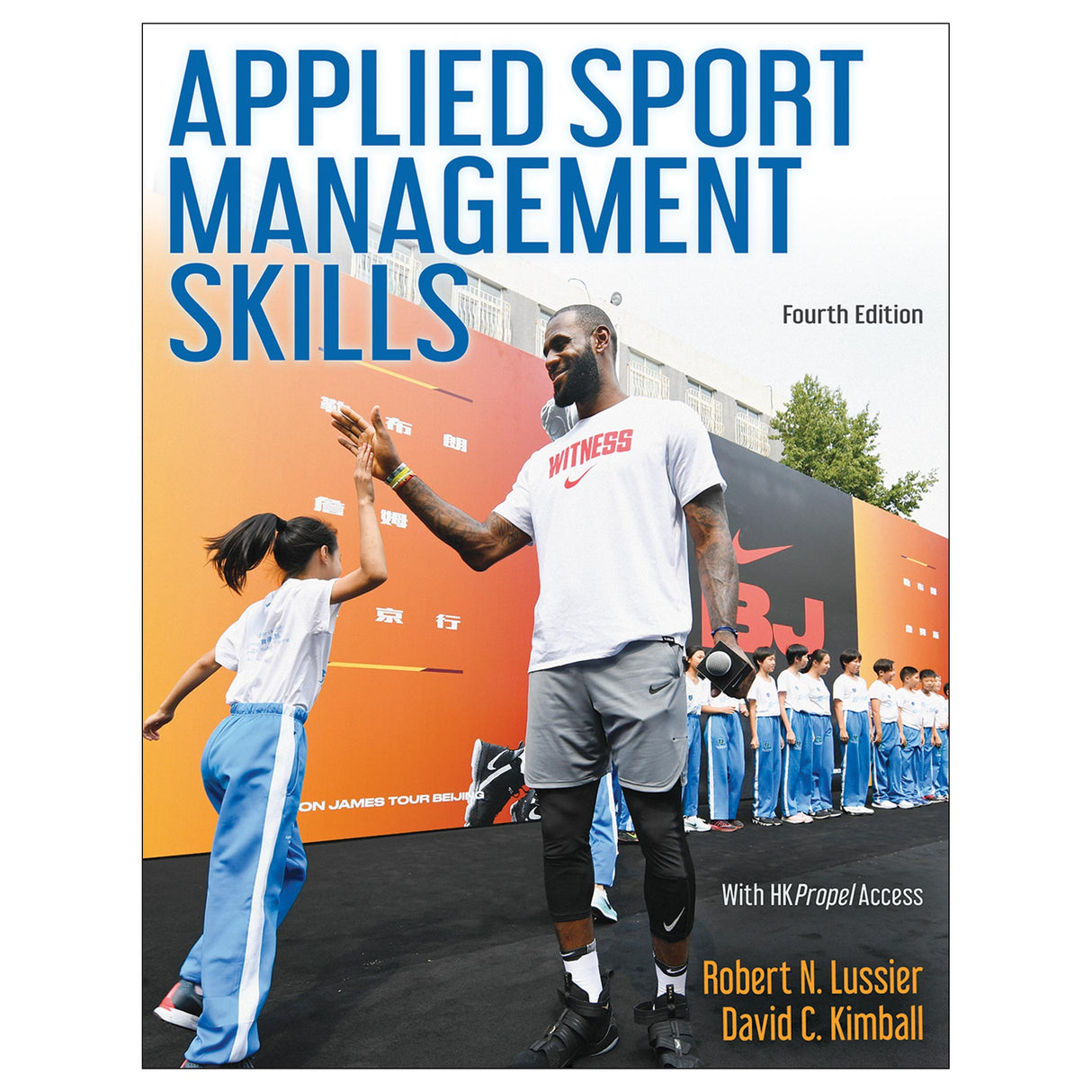Applied Sport Management Skills 4th Edition Ebook With HKPropel Access
Author: Robert N. Lussier, David C. Kimball
$135.95 CAD

The text employs a three-pronged approach for teaching management theory, putting theories into practice, and developing students’ management skills. Timely discussions and case studies address the impacts of COVID-19; Black Lives Matter initiatives; name, image, and likeness rules; women in executive positions; corporate social responsibility; data analytics; and more.
While other texts focus on learning about sport management, Applied Sport Management Skills enables students to apply the principles while developing the skills to become effective sport managers. Interactive online learning tools available through HKPropel complement activities found in each chapter:
- Flash-card activities help students learn key terms.
- Self-assessments, which ask students to identify their strengths and weaknesses and plan to improve shortcomings, are now assignable, trackable, and automatically scored.
- Applying the Concepts quizzes, which challenge students to identify management concepts illustrated in various situations, are now trackable and automatically scored.
- Time-Out features, in which students apply management concepts to their personal sport and work experiences, are now assignable instructor-scored assessments.
- Case studies are now supplemented by 10-question automatically scored quizzes and include three open-ended discussion questions.
- Sport Management Professionals @ Work activities provide a cohesive thread to keep students focused on how sport managers use the concepts on the job.
- Skill-Builder Exercises present real-world scenarios designed to help future managers handle day-to-day situations such as setting priorities, conducting job interviews, handling conflict, and coaching employees.
- Sports and Social Media Exercises introduce students to the role of social media in managing sport organizations. Students review popular social media sites such as Facebook, Twitter, and LinkedIn and visit sport websites.
- Game Plan for Starting a Sport Business features ask students to perform managerial tasks such as developing an organization structure and brainstorming ideas for leading employees.
Note: A code for accessing HKPropel is included with this ebook.
Audience
Applied text for students in sport management and administration, sport business, sport leadership, sport industry, and other sport management courses; reference for sport managers and libraries. The book is especially relevant to programs offering a management course taught by business faculty. Following COSMA and NASSM guidelines, it contains the management principles (planning, organizing, leading, and controlling) of traditional business books but with sport examples throughout the book.Chapter 1. Managing Sports
Why Study Sport Management?
The Sport Industry and Sport Management
Sport Manager’s Responsibilities
What Does It Take to Be a Successful Manager?
What Do Sport Managers Do?
How Do Managers Differ?
Learning Aids
Chapter 2. The Sport Industry Environment: Globalization, Ethics, and Social Responsibility
Internal Environment and Quality in Sport
External Environment
Conducting Sport Business in a Global Environment
Ethics in Sport Management
Why Good People Use Unethical Behavior
Guides to Ethical Behavior and Managing Ethics
Social Responsibility and Sustainability
Learning Aids
Part II. Planning
Chapter 3. Creative Problem Solving and Decision Making
An Overview of Problem Solving and Decision Making
Step 1: Define the Problem or Opportunity
Step 2: Set Objectives and Criteria
Step 3: Generate Alternatives
Step 4: Select the Most Feasible Alternative
Step 5: Plan and Implement the Decision
Step 6: Control the Results
Learning Aids
Chapter 4. Strategic and Operational Planning
An Overview of Strategic and Operational Planning
Strategic Process
Analysis of the Environment
Setting of Objectives
Corporate-Level Strategy
Business-Level Strategy
Operational-Level Strategies
Implementing and Controlling the Strategies
Learning Aids
Part III. Organizing
Chapter 5. Organizing and Delegating Work
The Organizing Function
Authority
Organizational Design
Job Design
Organizing Yourself and Delegating Work
Learning Aids
Chapter 6. Managing Change, Culture, Innovation, and Diversity
Managing Change
Organizational Culture
Innovation and Quality
Diversity, Equity, and Inclusion (DE&I)
Diversity Groups and Sports
Organizational Development
Learning Aids
Chapter 7. Human Resources Management
Human Resources Management Process and Department
Legal Environment
Human Resources Planning and Job Design
Attracting Employees
Interviewing
Developing Employees
Performance Appraisals
Retaining Employees
Learning Aids
Part IV. Leading
Chapter 8. Behavior in Organizations: Power, Politics, Conflict, and Stress
Organizational Behavior and Thoughts
Personality
Perception
Attitude Formation and Behavior
Power
Politics in the Office and on the Field
Managing Conflict
Negotiation
Collaboration Conflict Skills
Stress
Learning Aids
Chapter 9. Team Development
Importance of Teamwork to Performance
Group Performance Model
Group Structure
Group Process
Stages of Group Development and Leadership Styles
Getting to Better Meetings
Learning Aids
Chapter 10. Communicating for Results
Understanding the Importance of Good Communication
Using Organizational Communication
Using Interpersonal Communication
Using the Channels
Sending Messages
Receiving Messages
Responding to Messages
Dealing With Emotions and Criticism
Learning Aids
Chapter 11. Motivating to Win
Motivation and Performance
Content-Based Motivation Theories
Process-Based Motivation Theories
Reinforcement Theory
Putting Theory to Work Within the Motivational Process and Motivating Yourself
Learning Aids
Chapter 12. Leading to Victory
Leadership
Behavior of Effective Leaders
Contemporary Behavioral Perspectives
Situational Leadership Theories and Models
Getting to Your Personal Style of Leadership
Learning Aids
Part V. Controlling
Chapter 13. Controlling Quality, Financials, Productivity and Managing People
Quality and Control Systems
Control Process
Frequency of Controls
Financial Controls
Managing People
Managing Problem Employees
Productivity
Learning Aids
Chapter 14. Facilities and Events Management
Sport Facilities and Event Management
Sport Facilities Management
Sport Event Management
Planning and Controlling Sports
Sales Forecasting Techniques
Scheduling Tools
Time Management
Learning Aids
Afterword: The Future of Sport Management
Appendix: Careers in Sport Management
All ancillaries are free to adopting instructors through HKPropel.
Instructor guide. Lussier and Kimball have personally prepared chapter and lecture outlines; definitions of key terms; exercise ideas and suggestions for classroom use; and sample answers and solutions to the Time-Out and application exercises, review and discussion questions, and case study questions.
Test package. Contains over 1,200 questions in true-false, multiple-choice, and essay formats. The files may be downloaded for integration with a learning management system or printed for use as paper-based tests. Instructors may also create their own customized quizzes or tests from the test bank questions to assign to students directly through HKPropel. Multiple-choice and true-false questions are automatically graded, and instructors can review student scores in the platform.
Chapter quizzes. Contains ready-made quizzes (10 questions each) to assess student comprehension of the most important concepts in each chapter. Each quiz may be downloaded or assigned to students directly through HKPropel. The chapter assessments are automatically graded, and instructors can review student scores in the platform.
Presentation package. Features more than 390 PowerPoint slides of text, artwork, and tables from the book that can be used for class discussion and presentation. The slides in the presentation package can be used directly within PowerPoint or printed to make handouts for students. Instructors can easily add, modify, and rearrange the order of the slides.
Instructors also receive access to all student materials in HKPropel. For Applied Sport Management Skills, this includes unique learning activities and exercises that give students opportunities for applied learning.









